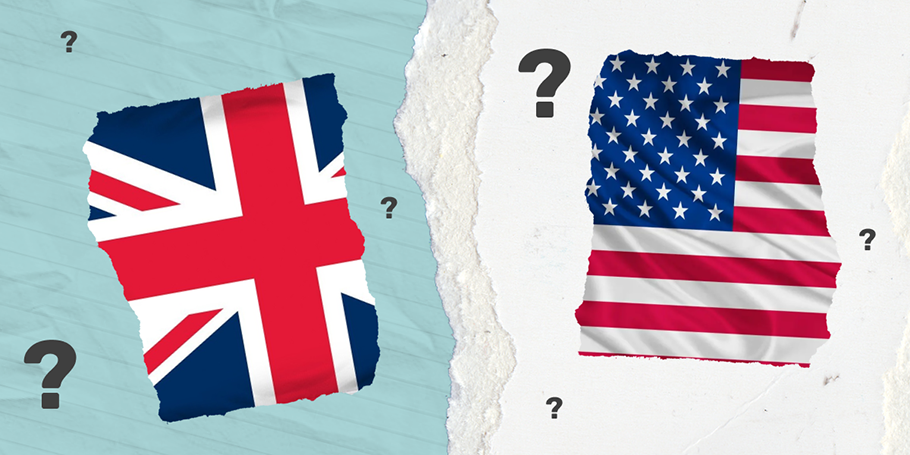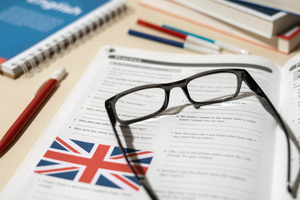Differences between British and American English: which one to choose for learning?
Oleksandra Kulish
Book expert
“England and America are two countries divided by one language.” It is unclear who exactly said this, but it is difficult to disagree.
A significant difficulty for people learning English is that there is no single standard for the language. Students have to learn two main variants at once — British and American English (not to mention Australian, Indian, South African, and other variants). Despite mutual cultural influence, it seems that every year the differences in vocabulary, spelling, and pronunciation between British and American English are only growing.
To stick to one style and, more importantly, to be understood correctly, it is worth knowing which words differ in meaning and pronunciation at least in the US and the UK. This is important not only for comfortable communication but also for avoiding misunderstandings or awkward situations.
After the colonization of America by Europeans, a process of mixing languages and cultures began, which also influenced the formation of the American version of English. Over time, these differences became the basis for the existence of two main forms of the language — British (BrE) and American (AmE).
British and American English — what's the difference?

Both versions are common in different parts of the world. For example, the British version is widely used in Great Britain, Ireland, Australia, New Zealand, and most European countries. The American version is used in the US, Canada, and some Latin American countries.
To make it easier to understand how British English differs from American English, let's divide these differences into three main categories:
- grammar;
- phonetics (pronunciation);
- vocabulary and spelling (word spelling and meaning).
Let's take a closer look at each of them.
Grammatical differences: from auxiliary verbs to prepositions
The American and British variants of English have differences in grammar — primarily in tenses, prepositions, articles, and the use of certain constructions. Let's look at the key differences with new examples.
1. Use of tenses.
In British English, the Present Perfect is actively used to describe actions that have just been completed, while in the US, the Past Simple is preferred even in such cases.
- BrE: He has just left the office.
- AmE: He just left the office.
In addition, British English speakers more often use the Past Perfect to describe past events in a specific order, while Americans limit themselves to the Past Simple.
- BrE: She had already packed when I arrived.
- AmE: She already packed when I arrived.
2. Use of prepositions.
In the US and UK, the same expressions are often constructed with different prepositions.
- BrE: They arrived at the station.
- AmE: They arrived to the station.
Or:
- BrE: We stayed at the weekend cottage.
- AmE: We stayed in the weekend cottage.
3. Use of articles.
In British English, the definite article the is more often used in cases where Americans omit it.
- BrE: He’s playing in the team this season.
- AmE: He’s playing in team this season.
4. Use of “have” and “have got”
The British prefer the construction have got, while Americans use the usual have.
- BrE: We’ve got a new neighbour.
- AmE: We have a new neighbor.
5. Colloquial abbreviations.
Americans more often use shortened informal constructions:
- AmE: I gotta finish this now.
- BrE: I have to finish this now.
- AmE: I wanna try that.
- BrE: I want to try that.
As you can see, there are several key differences between British and American English grammar, but they are fairly easy to learn.
Accent: how British English differs from American English
The easiest way to distinguish Americans from British people is by their pronunciation. Here are the main differences:
1. The sound [r].
In American English, the sound [r] is pronounced clearly and distinctly regardless of its position in a word. In British English, however, it is often omitted, especially at the end of words or before consonants.
- AmE: [ˈmɔːr] — more.
- BrE: [ˈmɔː] — more (the [r] sound is almost inaudible).
2. Vowel sounds.
The difference in the sound of vowels is one of the most distinctive features of the two variants of English.
- In the word “hot,” the sound [ɒ] in British English is shorter and more muffled, while in American English it is closer to the open [ɑ]:
- AmE: [hɑːt] — hot.
- BrE: [hɒt] — hot.
- In the word “dance,” British English speakers tend to use a long [ɑː], while American English speakers use [æ]:
- AmE: [dæns] — dance.
- BrE: [dɑːns] — dance.
3. Intonation.
Intonation patterns also differ. Americans have a more even, smooth rhythm, emphasizing important words. British English is characterized by more pronounced changes in tone, especially at the end of sentences — they can have both rising and falling intonation.
- AmE: Are you going tonight? ↘
- BrE: Are you going tonight? ↗
Knowing these phonetic differences will help you pronounce words more accurately according to the American or British standard, depending on which variant you prefer.
How the same words are written differently
When learning English, many people encounter confusion: how to write correctly — “color” or *“colour”? The answer depends on which version of English you are learning. “Color” is the American version, “colour” is British.
These differences in spelling arose due to reforms by American linguist Noah Webster, who created a dictionary of American English in the 19th century, simplifying and standardizing many spelling rules.
Here are some (but by no means all) of the most common examples of words whose spelling differs depending on the variant of English:
|
🇬🇧 British English |
🇺🇸 American English |
|
labour |
labor |
|
theatre |
theater |
|
catalogue |
catalog |
|
favourite |
favorite |
|
apologise |
apologize |
|
defence |
defense |
|
traveller |
traveler |
|
organise |
organize |
|
centre |
center |
|
mould |
mold |
|
plough |
plow |
|
cheque |
check |
|
aeroplane |
airplane |
|
pyjamas |
pajamas |
|
litre |
liter |
|
realise |
realize |
|
jewellery |
jewelry |
|
practise |
practice |
If you type the British version of a word in a program such as Microsoft Word, the American spell checker may automatically flag it as incorrect — this is another example of how important it is to know the difference between the two variants of the language.
Vocabulary: how British English differs from American English and why it is important to know

There are countless differences in vocabulary between British and American English — they can be considered almost endless.
For example, if an American tourist visits a restaurant in the UK for the first time, they will ask, “Can I get the check, please?” The waiter may be confused.
This is because in the UK, the word “bill” is used for this purpose, and it should be requested in this way.
There are many opportunities for confusion and awkward situations when using British English in the US or vice versa. And this is not limited to the UK or the US — such confusion can occur anywhere where a different variant of English is expected.
For example, in the UK, “lift” is the American “elevator” (lift), and ‘petrol’ is the American “gas” (gasoline).
Here are some other common examples of lexical differences:
|
🇬🇧 British English |
🇺🇸 American English |
|
flat |
apartment |
|
biscuit |
cookie |
|
boot |
trunk |
|
holiday |
vacation |
|
jumper |
sweater |
|
nappy |
diaper |
|
queue |
line |
|
petrol station |
gas station |
|
rubbish |
garbage/trash |
|
trainers |
sneakers |
The confusion with idioms and slang is particularly interesting. The most famous example is the word “pants”: in American English, it means regular trousers, while in British English, it means underwear.
If you plan to travel the world and use English, it is worth knowing these differences to avoid misunderstandings and be prepared for different language variants.
Which variant of English should you choose to learn first? Philologists and teachers still argue about which variant of English is better to learn. On the one hand, British English is considered classic, so many people believe that it is the one to learn. On the other hand, there are significantly more native speakers of American English, which opens up more opportunities for communication — which is what we want when we start learning a language.
In reality, there is no significant difference — speakers of both variants easily understand each other and, therefore, will understand you as well. So, without hesitation, simply learn English, and teachers of both British and American English will help you adapt your knowledge to your needs.









